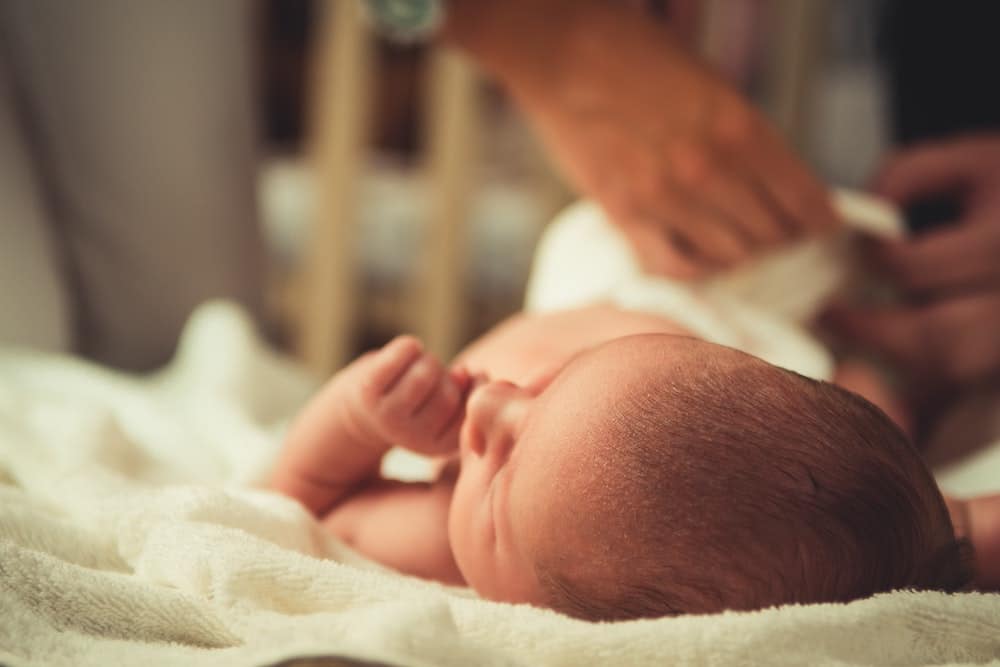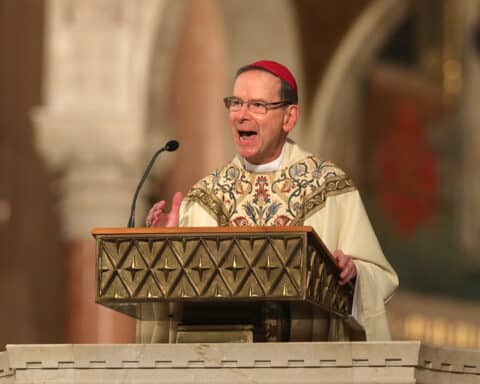Pregnancy centers and maternity homes generally agree that making childbirth free in the United States would empower women to choose life.
But, some specify, it would help in varying degrees.
Leaders of life-affirming pregnancy center networks, individual pregnancy centers and maternity homes — people who see the needs of struggling pregnant and parenting women firsthand — spoke with Our Sunday Visitor about the concept of free birth. While they voiced different positions, they agreed on one thing: Money is a concern for the women they serve.
Many of these women rely on Medicaid, a joint federal and state health care program for lower-income Americans, which finances about 42% of U.S. births. At one maternity home in Virginia, Medicaid covers all of the women there. Other pregnancy centers said that women in need turn to them after falling through the cracks.
Pregnancy centers that provide free medical care, such as Alternatives Pregnancy Center in Sacramento, California, serve both insured and uninsured women seeking help. Another pregnancy center in Connecticut encounters clients who are more worried about the work and expense of raising a child than the cost of birth.
Regardless of the situation, these homes and centers promise to help women in any way they can — by providing or connecting them with the resources they need to choose life.
What is ‘free birth’?
In January, pro-life leaders published a proposal to “Make Birth Free” in the United States. The white paper followed a piece in The Atlantic with the same name: “Make birth free.”
The report, by Catherine Glenn Foster, the president and CEO Americans United for Life, and Kristen Day, the executive director of Democrats for Life of America, began by emphasizing the cost of childbirth. The average birth costs nearly $19,000, the two pro-life leaders wrote, with privately insured women still paying more than $3,000 out-of-pocket just for delivery.
They went on to estimate the costs — and benefits — of making birth and other assistance free, while taking into consideration that Medicaid already covers 42% of U.S. births.
Their plan, aimed at Congress, would enable mothers to choose life, the pro-life leaders said. Among other things, they cited a 2004 survey published by the Guttmacher Institute, a reproductive research organization once associated with Planned Parenthood, finding that 73% of women cited “can’t afford a baby now” as a reason for abortion.
“Our mission is to remove barriers around pregnancy and parenting, which is often a financial burden,” Jess Meeth, the national communications director for DFLA, told Our Sunday Visitor. “The high cost of birth is just one one of these barriers we need to remove.”
Pregnancy centers respond
Andrea Trudden, the vice president of communications and marketing for Heartbeat International, a network supporting thousands of pregnancy centers, supported the idea.
“Anytime we can find ways to lessen the financial burden for families, we should,” she said. “Clients who come to pregnancy help organizations often walk in needing to overcome a challenge, such as finances. When they are able to talk through their concerns and set a plan for their future, many of the fears fade away.”
In the United States, roughly 3,000 pregnancy centers provide pregnant and parenting women with life-affirming care at little to no cost. According to the Charlotte Lozier Institute, the research arm of Susan B. Anthony Pro-Life America, these centers gave away services and material assistance worth more than $266 million in 2019 alone.
“Through job training, material aid and help to navigate government resources available to them, pregnancy help organizations walk alongside expectant mothers and partners to help prepare them for parenthood,” Trudden said.
The importance of Medicaid
Addressing the concept of free birth, Kathleen Wilson, the executive director of Mary’s Shelter, a faith-centered maternity home in Fredericksburg, Virginia, said that Medicaid covers all of the mothers they serve.
“Thank heaven they can get Medicaid,” she said, “or many would never be able to pay a hospital bill, and making their choice of life might be very different.”
At the same time, Wilson, a Catholic, said that her maternity home accompanies these women in their employment and educational goals “so they can sustain that independent lifestyle, including health care.”
A loophole in coverage
While she did not weigh in on possible congressional legislation or the specific proposal by pro-life leaders, Debbie Capen, the executive director of MiraVia in Charlotte, North Carolina, saw the benefits of free birth in general.
“Offering free labor and delivery to pregnant women would remove a huge barrier for many mothers who are hesitant to choose life for their child,” said Capen, who leads a Catholic nonprofit with an outreach center and a free college residence at the nearby Belmont Abbey College, where pregnant students from any university or college can stay until their child turns 2 years old.
She highlighted a group that could particularly benefit from free childbirth: young pregnant women who are listed as dependents on a parent’s insurance plan.
Capen says that they have found that insurance plans of large employers — or employers with 50 or more employees — are not required to cover labor and delivery for dependents. Even though Medicaid exists, she said, the program does not help many women who are covered as dependents.
Outlets including NPR and CNBC have noted the loophole that affects young adults who can now remain on a parent’s plan until they reach the age of 26. This could affect millions. According to an analysis published by CNBC Make It in 2019, around 4.2 million women ages 19 to 25 are covered as dependents.
A Centers for Medicare & Medicaid Services (CMS) spokesperson clarified to Our Sunday Visitor that coverage as a dependent on a parent’s health plan does not make an individual ineligible for Medicaid “because being uninsured is not an eligibility factor for most Medicaid categories, including for pregnancy.”
Instead, the CMS spokesperson said that eligibility depends on whether someone meets financial and certain nonfinancial criteria for coverage. This could impact a dependent who is living in her parent’s house, the CMS spokesperson added.
“For pregnant individuals living in their parent’s household, their financial eligibility will generally count the parent’s income, which can mean that a pregnant individual is over-income for Medicaid,” the spokesperson said. Nonfinancial criteria, the spokesperson added, can include qualifying citizenship and immigration status.
At MiraVia, Capen said that they help connect women to any resources they need. Free birth, she said, would help.
“Our nonprofit does not have the budget to cover medical expenses for our clients, so instead we focus on helping them apply for different insurance options or finding pro-bono providers,” Capen said. “If giving birth were free for all women, it would allow us to spend more time helping mothers to prepare for life with their child and achieving the goals they have for long-term success.”
Falling through the cracks
Leticia Velasquez, the executive director and co-founder of Pathways Pregnancy Inc., in Norwich, Connecticut, said that her four-year-old center also does not have the means to cover medical care.
She has encountered two clients — both Latin American and without green cards — who did not qualify for either Medicaid or private insurance, she said, adding that one sought help while suffering financially.
“One of my Latina clients was from Guatemala and had been in a hit-and-run car accident as a pedestrian,” Velasquez, a Catholic, remembered. “She was in debt to the doctor who performed surgery.”
That debt, she said, likely influenced this woman’s decision to choose abortion.
While more assistance helps, Velasquez did not see maternity-care expenses as the deciding factor in most of the mothers’ decisions for or against abortion. Some of her clients, she said, are more concerned about the cost to raise a child.
“I had two married clients who aborted to keep down their family size,” she said. “They were on Medicaid, so it wasn’t just the expense of giving birth; it was the work and expenses of raising a child.”
Along the way, she said, her center accompanies these women by providing material items, referring to local support services for employment, Medicaid and housing, and offering free ultrasounds and emotional support.
A demand for medical care
Before Heidi Matzke became the executive director of Alternatives Pregnancy Center in Sacramento, California, she spent 15 years selling health insurance to individuals and small businesses. The women she serves today, she said, would benefit from free birth.
“If a woman did not have to worry about the cost of paying for childbirth when faced with an unplanned pregnancy, it would greatly encourage her to choose life — without question,” she said.
Last year, Matzke testified before Congress about the work of her pregnancy center, which includes a team of obstetrician-gynecologists, registered nurses and medical assistants.
“Our clinic gives women free medical care regarding their pregnancy without the burden of worrying about money, so they have an opportunity to consider their options before making a definitive decision,” she told Our Sunday Visitor. “When the financial obstacle is removed and she can access immediate health care, a woman has space to consider all her options.”
Her center regularly encounters both uninsured and insured women worried about the cost of birth, she said.
“Most individuals’ monthly premiums for health insurance can sometimes rival the cost of their rent [or] mortgage; then, you add to the insurance premium their high-deductible, out-of-pocket expense for their hospital visit to give birth — this is an overwhelming financial burden to women,” she said.
Among other things, her center helps these women by covering the costs of their prenatal care for up to 24 weeks and connecting them with private practices that work with women who cannot afford to give birth, she said.
“If women had access to free birth,” she concluded, “it would allow us to use our financial resources to grow and help more women in need.”
Katie Yoder is a contributing editor for Our Sunday Visitor.





